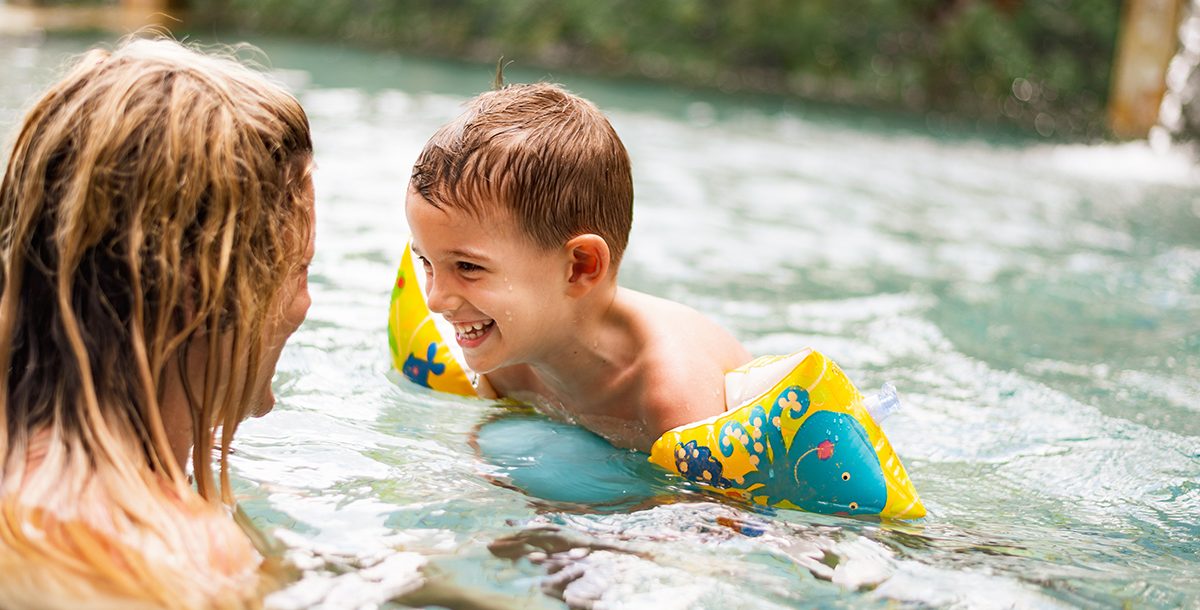Swimming is an excellent way for the family to burn off energy, have fun and cool off during the summer months. However, it can be dangerous if you don’t do it safely.
After birth defects, drowning is the number one cause of death for children ages one to four years old. It is also one of the top causes of accidental deaths in the United States for adults. Drowning is silent and happens in minutes. Even people who survive water accidents can have permanent brain damage or end up with physical disabilities.
Keep yourself and your family safe near the water this summer by following these swimming safety tips.
Never swim alone
No matter how old you are or how good a swimmer you are, you should never swim by yourself. Always bring a friend or only swim when a lifeguard is on duty. You never know when an accident can happen, and you’ll need someone to call for help or pull you out of the water.
Never leave a child unattended near water
Children, no matter their skill level, should never swim alone. They need to be supervised at all times. Even turning your back for a few minutes to talk to someone or look at your phone can have dire consequences. If your child wants to swim, you or another trusted adult should always be present.
When at a pool, assign at least one adult as a “water watcher” to pay constant attention to the children. This person should put down their cellphone, avoid participating in water activities and having intense conversations with other adults. Having a “water watcher” is a good idea even when there is a lifeguard present.
Avoid horseplay
Pool time usually means fun time for kids and adults alike. But never let that get out of hand. Avoid horseplay, like pushing or shoving others near the water. Also, don’t run near the water. While it may seem fun and innocent at the time, it can lead to serious accidents.
Take your phone and learn CPR
If you or your children are going swimming, bring your phone along as there may not be a phone at the pool, lake or beach. This way, if something does go wrong, you can easily call 911. Just don’t let your phone distract you when you’re supposed to be watching children.
Also, take a CPR course or renew an old certification. Knowing what to do medically during an emergency is important for you to be prepared to act if necessary.
Make sure everyone in your family knows how to swim
Some people put off learning to swim until they’re teenagers or adults. But the earlier you get your kids started, the better. In fact, learning how to swim can help reduce the risk of drowning for children.
In most cases, you can get your baby in the water as early as six months as long as they’re wearing a swimming diaper. In general, the sooner a person feels comfortable around the water, the better their chances are of surviving an accident.
Keep your own pool safe
If you have a pool at home, be extra cautious, especially if you have young children around. Make sure the pool has a fence around it. The fence should be non-climbable, at least four feet high and have a gate that is self-closing and self-latching. You should also keep toys out of the pool when it’s not in use, so kids aren’t tempted to try and get them.
Pool covers, door alarms, window guards and pool alarms can be additional layers of protection when used with a fence. It’s a good idea to have a few U.S. Coast Guard-approved life jackets on hand too. Also, make sure your drain covers are always in place and that your kids understand that they should not play in the water near the drains.
Don’t swim when it’s stormy
Always stay out of the water in poor weather conditions. Even if you can hear the storm but doesn’t seem very close, lightning can still strike you in the water.
Always follow the rules, no matter where you swim
Whether you’re swimming in a public pool or at the beach, always follow any rules posted or given by a lifeguard. Look for warning flags at the beach or talk to the lifeguard about the day’s swimming conditions.
Learn about all the health care services we offer at Mercy Health.






